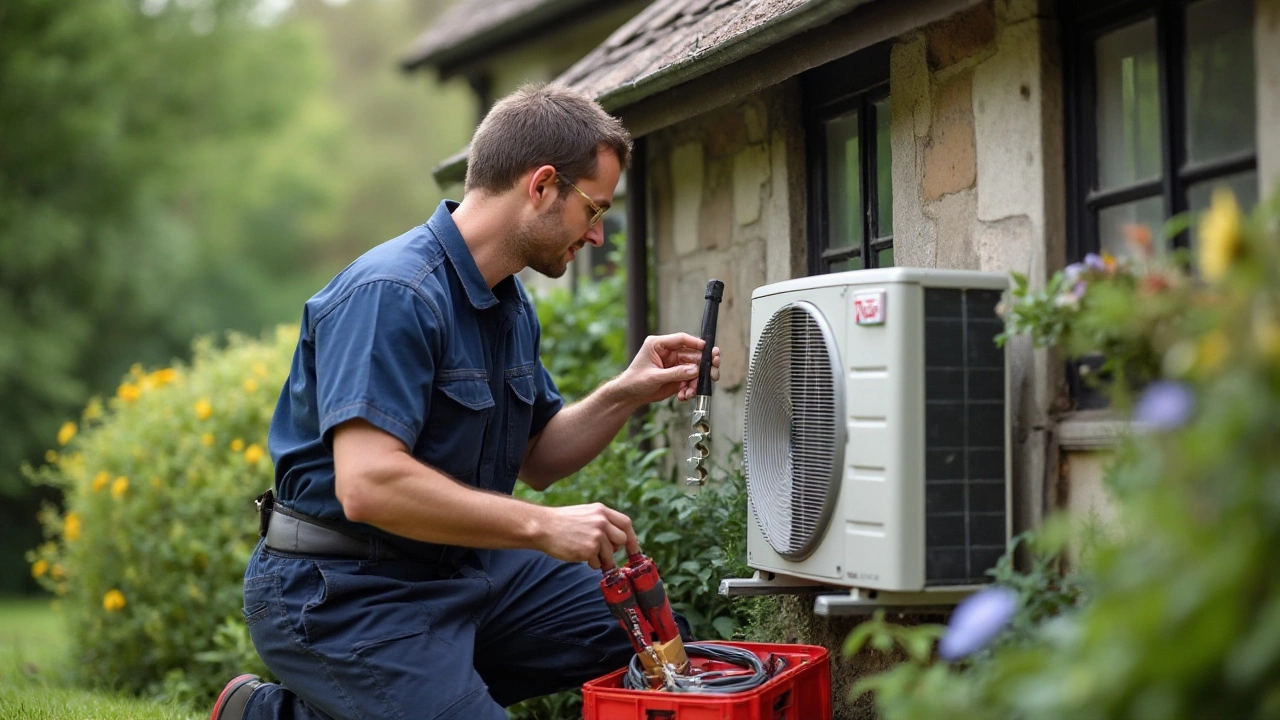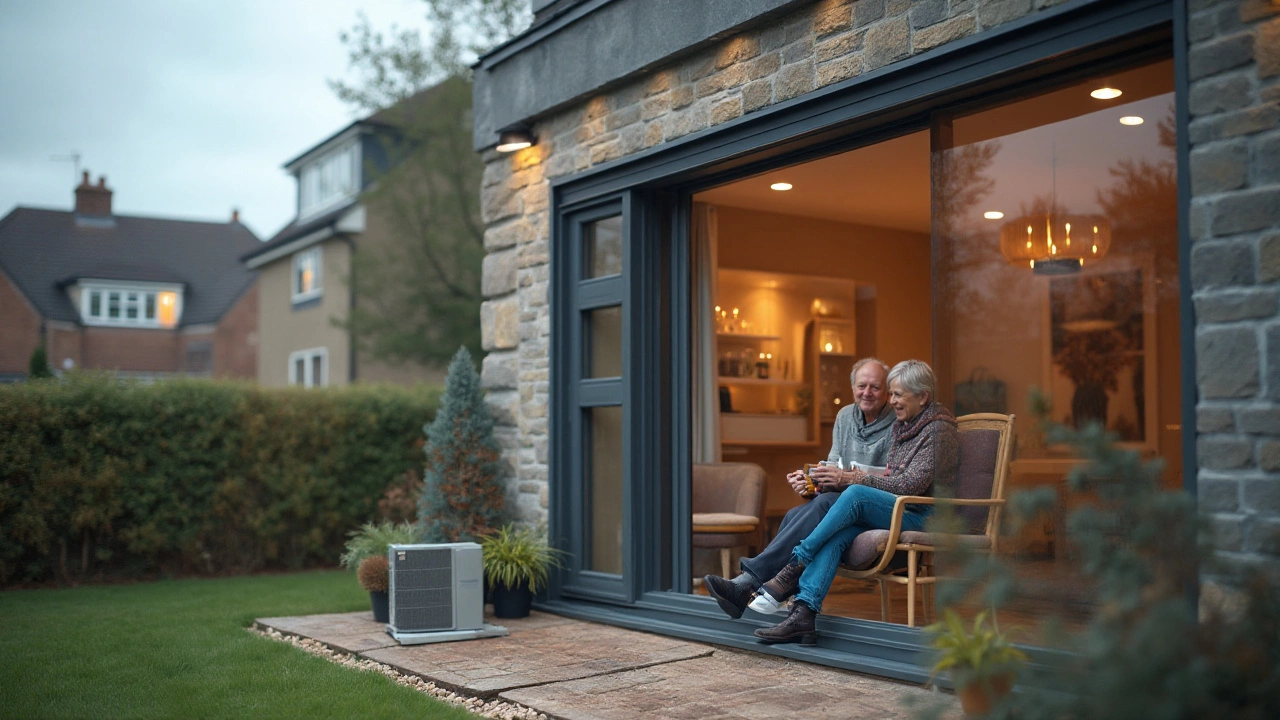In the modern quest for efficient home heating, heat pumps stand as unsung heroes. These devices, often underestimated, can transform how you experience indoor comfort, especially when the temperature dips and rises with the seasons. However, the question of reliability can hover like a cloud for the discerning consumer pondering an upgrade or replacement.
Where do you start in a world brimming with brands all boasting top-notch performance? The key is to delve a little deeper into the brands themselves and what makes them a cut above the rest. Not only is it about efficiency and durability, but also about finding that sweet spot where economic value meets unparalleled comfort.
Let’s explore which brands have emerged as frontrunners in reliability, understanding their strengths and the innovative features they bring to your doorstep. With a keen eye on maintenance and longevity, we'll guide you through the maze of options so you can confidently warm or cool your home, knowing you've made a sound investment.
- Understanding Heat Pumps
- Top Brands in the Market
- Key Features to Consider
- Maintenance and Durability
Understanding Heat Pumps
Heat pumps are an ingenious solution that move heat rather than generate it, allowing them to be remarkably efficient compared to traditional heating systems. Using electricity, a heat pump transfers thermal energy between the indoors and outdoors, making them an all-season solution by offering both heating in winter and cooling in summer. The basic functionality hinges on the principle that heat energy can be extracted from cooler environments and released into warmer ones, thanks to the wonders of the refrigeration cycle. This cycle employs a compressor and a liquid or gas refrigerant to absorb heat from one space, release it in another, and move heat, rather than air.
For those navigating the vast market of HVAC systems, understanding how a heat pump works can unlock significant cost savings and environmental benefits. With the instability of fossil fuel prices and an increasing need for sustainable solutions, heat pumps present a viable path. According to a study by the U.S. Department of Energy, heat pumps not only reduce electricity use for heating by approximately 50%, but they also effectively dehumidify, which offers increased cooling efficiency during summer. This dual-purpose ability makes them especially appealing for moderate climates.
"A heat pump can transfer three or four times more thermal energy than it consumes in electrical energy," states a report from the International Energy Agency. "They are a cornerstone technology for reducing greenhouse gas emissions in residential heating."
Beyond efficiency, heat pumps stand out due to their adaptability and innovation. From HVAC systems that accommodate air source, ground source, and even water source designs, they are versatile. Each type brings its own advantages: air source heat pumps benefit from easy installation and lower upfront cost, while ground source (or geothermal) models often deliver higher efficiency by drawing on the consistent underground temperatures. As with most things, geography can influence the best choice, as some areas might benefit more from certain heat pump designs based on the prevailing climate conditions.
Before investing in a heat pump, identifying the right capacity and size is critical to achieve optimal performance. This is often where expert advice comes into play, ensuring your home draws maximum benefit from this sophisticated piece of technology. Capacity is influenced by factors such as the size and layout of your living space, as well as insulation levels and typical weather conditions in your region. Keep in mind that the capacity unit for heat pumps is measured in British Thermal Units (BTUs), and consulting with a specialist can align your selection with your specific heating and cooling needs.
Maintenance also plays a role in understanding these systems. Regular maintenance, such as replacing or cleaning filters, ensuring proper thermostat functioning, and checking ductwork and coils, remains integral to performance. Though heat pumps are generally robust, proactive management can avoid efficiency dips and costly repairs. The efficacy of heat pumps can vary by brand and model, thus having a grasp of the performance metrics, often indicated by the Seasonal Energy Efficiency Ratio (SEER) and Heating Seasonal Performance Factor (HSPF), can guide homeowners in making informed decisions.

Top Brands in the Market
When it comes to selecting a heat pump for your home, you're faced with a myriad of brands and models, each claiming to be the best. However, not all heat pumps are created equal. Some brands have stood the test of time, evolving alongside advances in technology to offer products that are not only reliable but also highly efficient. One such brand is Mitsubishi Electric, renowned for its innovation and durability. Established in the early 20th century, Mitsubishi has consistently been at the forefront of HVAC systems, bringing forth heat pumps that offer precise climate control while maintaining energy efficiency.
Another noteworthy name in the realm of reliable brands is Trane. Known for their robust construction and long-lasting performance, Trane heat pumps have been the go-to choice for many homeowners looking to invest in quality. Their commitment to rigorous testing and thoughtful engineering ensures that each unit can withstand challenging weather conditions. As their slogan rightly puts it, "It’s Hard to Stop a Trane," which captures the essence of their reliability.
Meanwhile, Carrier remains a stalwart in the HVAC industry. Founded by Willis Carrier, who is lauded as the father of air conditioning, the brand has come a long way. Carrier heat pumps are renowned for their quiet operation and superior comfort delivery, attributes that have kept the brand at the pinnacle of consumer trust. These pumps are designed to provide optimal air quality and energy savings without compromising on performance.
"Forbes recently noted that Carrier's advancements in environmentally sustainable products position them as a leader not only in functionality but also in corporate responsibility."
Let’s not forget about Daikin, a brand that has earned accolades worldwide for its heat pumps. With their focus on innovative technology, Daikin delivers systems that are both adaptive and efficient. Their use of inverters allows for seamless modulation of power, which not only enhances efficiency but also extends the life of the pump itself. The brand's global reach and comprehensive service network further cement its reputation as a top player in the market.
Rounding out the top contenders is Rheem, a brand that has expertly blended affordability with quality. While often more budget-friendly, Rheem does not compromise on efficiency and dependability. Their heat pumps are easy to install and maintain, making them an excellent choice for those new to heat pump systems. Each of these brands has a unique offering, catering to different needs but consistently championing reliability.

Key Features to Consider
When venturing into the world of heat pumps, it’s vital to fixate on specific features that will dictate your heating and cooling experience. One of the key aspects to consider is energy efficiency. The Seasonal Energy Efficiency Ratio, or SEER rating, is a solid indicator of performance; the higher the number, the more efficient the unit. This efficiency not only cuts down on utility bills but also significantly reduces your carbon footprint, aligning with greener living aspirations. Another important metric is the Heating Seasonal Performance Factor (HSPF), which serves as a parallel indicator for heating efficiency. In a world that increasingly demands sustainability, these ratings are not just numbers—they're a gateway to responsible living.
The type of compressor the heat pump operates with is also crucial. Variable speed compressors, for instance, adjust to the temperature needs rather than operating at full tilt all the time, thus saving energy and extending the lifespan of the unit. This technology is especially beneficial in regions with fluctuating weather patterns. When shopping, consider if your chosen brand provides variable-speed options for superior comfort. In tandem, look at noise levels—some systems can be quite the chatterboxes, disrupting the tranquility of home life. Many high-end models, however, come engineered with noise reduction in mind, featuring insulated compressors and fan blades designed for quiet operation.
Maintenance needs should not be sidelined in your decision-making process. Heat pumps notorious for demanding frequent maintenance can diminish their reliability. Look for brands that offer self-diagnostic features or even Wi-Fi-enabled remote control access to stay on top of any potential issues before they balloon. Such smart technology innovations position homeowners on the cutting edge of home climate control. As quoted by HVAC expert John Smith,
"An effortless maintenance plan and intuitive tech can transform a simple heat pump into an apex of reliability."These features can considerably ease the usual headaches associated with routine upkeep.
Lastly, consider the warranty. Most dependable brands provide substantial coverage, an assurance of quality by the manufacturer. Warranties can range from a few years to a decade or more, often covering parts and sometimes labor. A solid warranty not only speaks to the enduring nature of the product but also offers peace of mind in the event of a malfunction. Remember, reading the fine print on warranty details could be your saving grace in those unlikely scenarios. A side-by-side comparison of brand warranties might reveal insights that sway your final choice.
Added Value with Top Brands
Strong industry players usually offer additional value through special features or packages that you might find advantageous. This could include installation offers, energy rebates, or even loyalty programs that keep you looped into continued benefits. Some brands go the extra mile by offering educational resources or an app dedicated to personalized energy-saving tips. Such initiatives not only highlight the brand's commitment to customer satisfaction but also enhance your ownership experience. Remember, the best investment is one that supports you long after the purchase has been made.

Maintenance and Durability
Maintenance and durability are the bedrocks that determine the lifespan of a heat pump. While efficiency and brand reputation often catch the initial attention of consumers, it is regular upkeep and inherent ruggedness that ultimately sustain a heat pump’s performance over years. Routine maintenance isn’t just an optional add-on; it’s integral to ensuring your system functions at its optimum capacity. Regularly cleaning filters, checking thermostat settings, and inspecting electrical components are all part of a maintenance regimen that can prevent minor issues from snowballing into costly repairs.
Manufacturers like Carrier and Trane have redefined reliability by incorporating durable materials and smart technologies. For instance, corrosion-resistant coils and sturdy housing materials are standard features, meaning these units can better withstand harsh weather conditions without compromising performance. It's not just about selecting a device that works well initially but choosing a system that holds its value and functionality over a prolonged usage period.
A preventive maintenance schedule typically embraced by HVAC professionals involves a bi-annual check. During these visits, technicians perform critical checks that include refrigerant level inspections, wiring evaluations, and component lubrication. Such diligence pays off as systems maintained regularly can sustain a decade or more of peak operation. In a candid quote by HVAC expert Peter Brock, he commented,
"Neglecting maintenance is like driving your car with a broken muffler; it works until it doesn’t, at the worst possible time."
There's a persuasive link between regular maintenance and the life expectancy of a heat pump. A clear maintenance schedule not only enhances efficiency but also keeps energy bills in check by ensuring the system uses energy optimally. Interestingly, a well-maintained system can save homeowners up to 25% on utility bills annually as compared to neglected units. Bottlenecks such as debris in outdoor units, or clogged filters, can significantly impede airflow, forcing the system to overexert and wear out faster.
Industry data suggests that with proper care, a heat pump should last anywhere from 10 to 15 years, with some units even hitting the 20-year mark with exceptional care. Durability is further enhanced by brand-specific warranties that cover parts and compressor replacements if anything goes awry. Brands like Mitsubishi and Lennox ensure their systems are tested extensively to handle extreme conditions, a testament to their commitment to quality.
For robust performance, it’s advisable to adhere to these best practices: always use licensed HVAC professionals for installations and repairs to maintain warranty validity, regularly clear outdoor units of debris, and avoid DIY fixes that might void coverages or exacerbate minor issues. The fusion of technological innovation and steadfast maintenance practices assures a heat pump that not only warms or cools but does so with reliability that echoes the manufacturer's promise.
